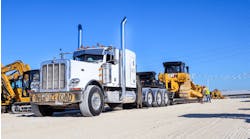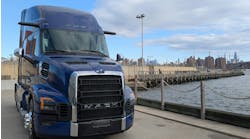Imagine if your trucking company survived the fleet culling of 2019 and overcame the Great Pandemic of 2020 only to be undone by one driver not paying attention on one short stretch of highway, resulting in a fatal crash and nuclear verdict, or a judgment for the plaintiff in excess of $10 million. You and all of your trucking company employees, the ones who sacrificed for months to get this country through a generational crisis, would be looking for jobs at one of the worst times in history to be updating a resume, with unemployment at possibly reaching 20% for May.
It’s a horrible hypothetical, but not as unlikely as one would think.
“If you look at the data, in 2011, it's like somebody flipped the switch,” said defense attorney Rob Moseley, founding partner at Moseley Marcinak Law Group, which represents transportation and logistics companies. “And since then, on average, we've had a verdict of over $10 million against a trucking company every other month.”
At the American Trucking Associations’ (ATA) Management Conference & Exhibition in early October last year, Chris Spear, ATA president and CEO, said “nuclear verdicts are strangling our industry.” Nuclear verdicts are judgments in excess of $10 million.
About a week later, Werner Enterprises was found liable for a New Mexico crash in February 2017, where a recent graduate of Werner’s Roadmaster Drivers School lost control, slashed through four lanes, jumped a concrete median and collided with a woman, who died on scene. Her death resulted in $40.5 million judgment, which was later settled.
The previous year, Werner lost a near $90 million civil suit dating back to a 2014 accident in which a pickup truck carrying a family crossed a median on an icy stretch of Interstate 20 near Odessa, Texas, and was struck by a Werner truck driven by a student driver. One boy was killed and a 12-year-old girl was left a paraplegic, with another son and the mother with less severe physical injuries.
The key thing in this case was that plaintiff’s attorneys argued that due to the winter storm warning issued by the National Weather Service, the tractor-trailer should not have been operating at the time the pickup lost control. The truck should have been rerouted, they posited, and the driver did not have an outside temperature gauge or CB radio to better prepare understand the road conditions. Speed was also a factor, though the driver was traveling under the speed limit at the time of the crash.
Moseley, who provided advice on a recent FleetOwner webinar (sponsored by SmartDrive) called "Both Sides of the Legal Equation: An Insider’s Perspective on Fleet Safety," attributed 75% of the highway accidents involving passenger and commercial vehicles to the passenger car driver. But the commercial fleets don’t win 75% of the cases, he noted.
Moseley said the reasons for such mega verdicts happening more frequently is the evolution of plaintiff lawyers “who are willing to work hard to understand the trucking business and willing to try a case.”
“The best day for you is if you get sued by one of the billboard lawyers, because they're likely not going to do the things that need to be done to put you on the ropes,” he said.
These lawyers use public data from the Federal Motor Carriers Safety Administration and the knowledge of modern available truck technology. They also subpoena carriers’ drivers and former employees to uncover any infraction or weakness to exploit.
“They try to find things that you would have found if you were doing what they contend you should do,” Mosely said. “Big verdicts are usually preceded by some sort of conduct, not from the driver, but from the motor carrier management.”
While safety and compliance costs don’t come cheap, they may be a carrier's best defense. One way safety and compliance departments defend fleets is by looking at the trucking company’s safety data generated by the telematics system, which includes speed, hard-braking, and lane departures. Plaintiff lawyers will compare that data to how the safety director and/or fleet manager intervened. If a driver had several instances of hard braking and was never coached up to avoid those in the future, that could make the fleet liable.
Mosely said once data is no longer needed to actively manage a driver, get rid of it.
Aside from not giving the opposition any help, it prevents a jury from getting the wrong idea about a driver’s performance. Moseley said even good drivers may accumulate dozens of warnings due to hours of service or other infractions over 15 years. For instance, if a jury sees they have 74 violations, they don’t look for context, only that big number.
“What happened is the trucking company made their best driver look like a bad driver,” he explained.
Another area to watch for is trailer liability. Trailers are shared by many fleets to create efficiencies in hauling and avoid detention time to improve their productivity. A fleet needs to be prepared to be covered in case a borrowed trailer blows a tire or suffers a brake failure.
Finally, Moseley warned to be adequately covered for typical verdicts, which on average reach $2 million.
“A million dollars is not enough in today's environment,” he said.
In the follow-up, we will present the plaintiff lawyer’s perspective to show what you are up against and how to defend yourself.




